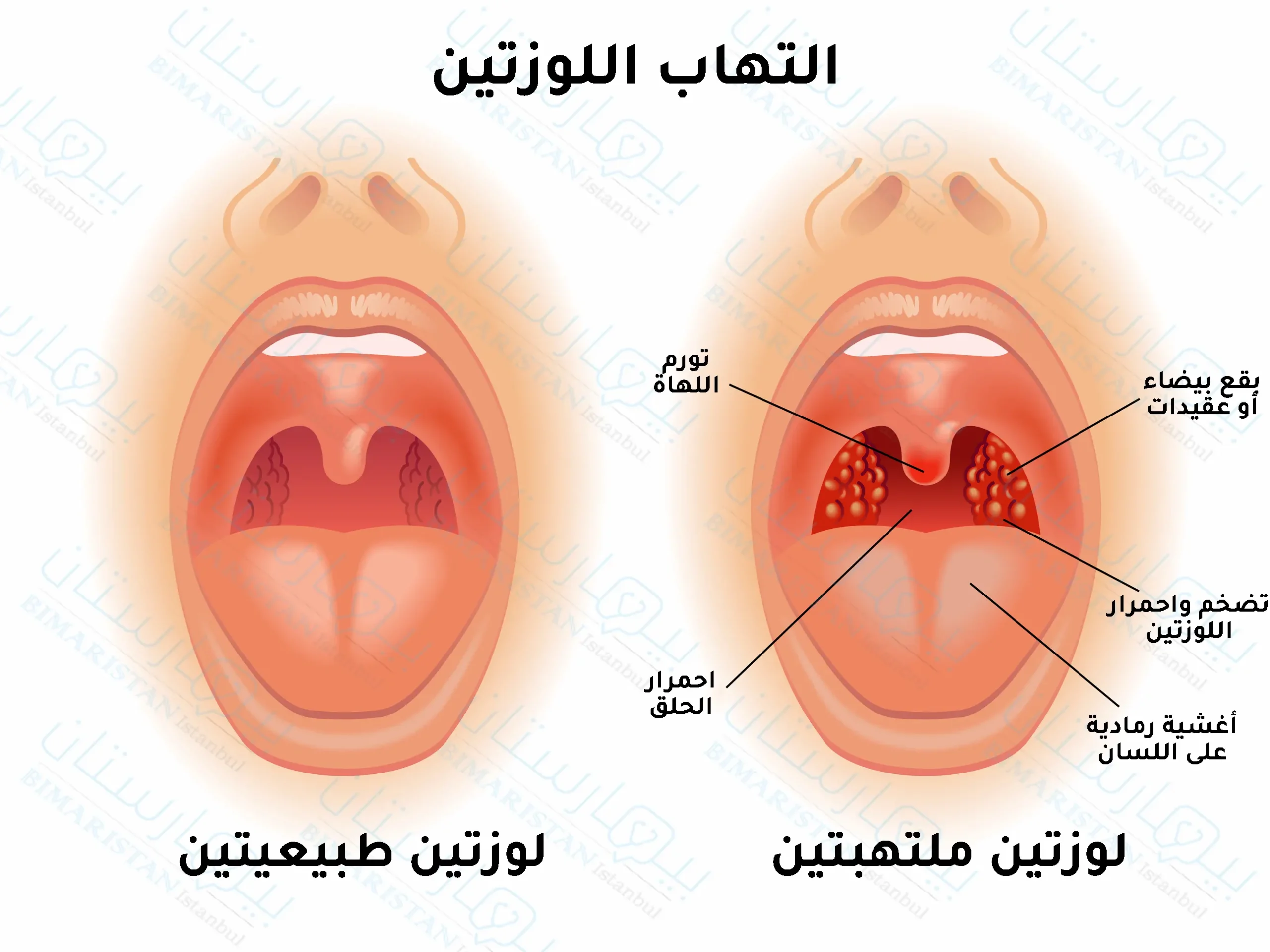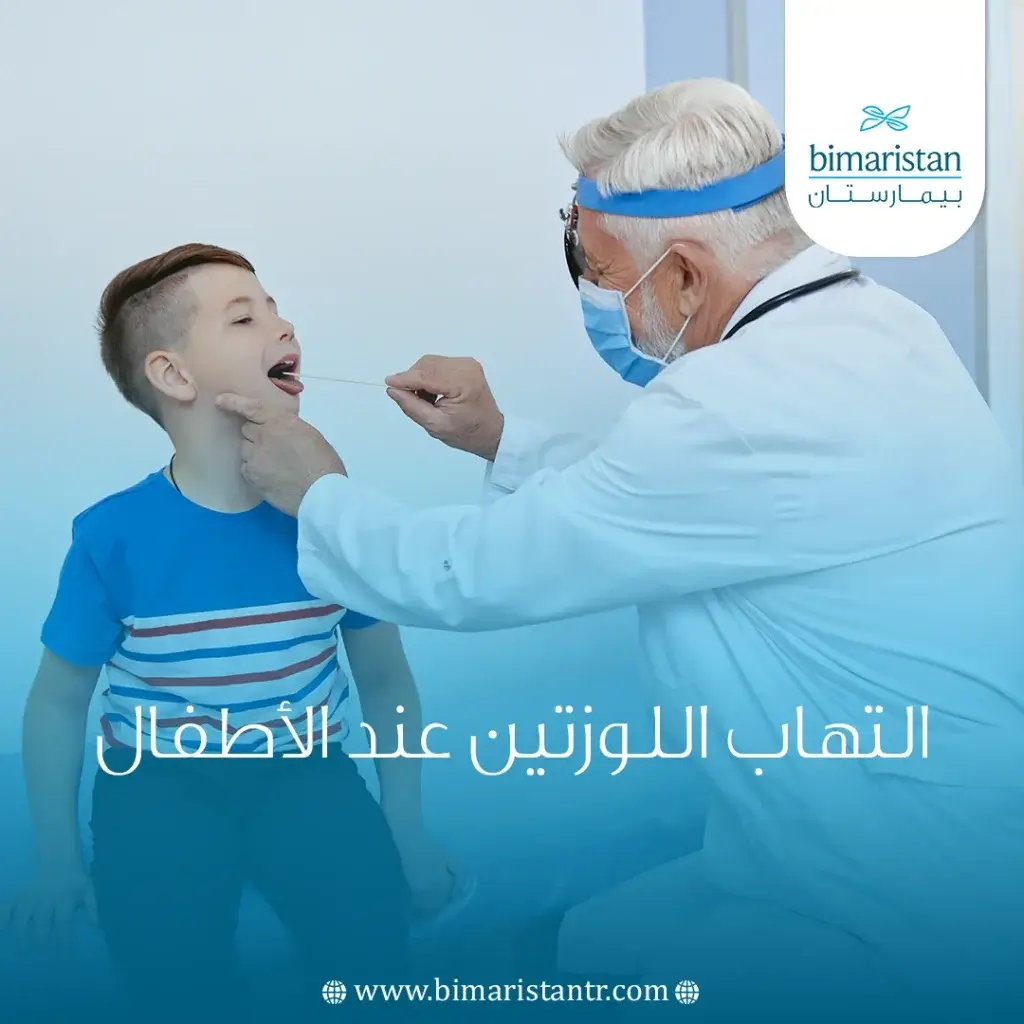يعد التهاب اللّوزتين من الحالات الشائعة بين الأطفال، تعرف على أهم أعراض وأسباب وطرق علاج التهاب اللوزتين عند الأطفال في حال كان يعاني طفلك من التهاب اللوزتين.
لمحة عامة
اللوزتان عبارة عن غدتين تقعان في مؤخرة الفم على الجانبين، وهما جزء من جهاز المناعة المسؤول عن الدفاع عن الجسم ضد الأحياء الدقيقة التي تدخل عن طريق الفم أو الأنف قبل أن تدخل هذه الدقائق وتسبب التهاباً في كامل الجسم.
واللوزتان تقومان بوظيفتهما على أكمل وجه عادةً، لكن في بعض الأحيان تصاب لوزتا الطفل بإحدى الإنتانات البكتيرية أو الفيروسية وتسبب فيهما الالتهاب. وبما أن وظيفة اللوزتين المناعية تتراجع مع التقدم بالعمر حتى تزول تماماً يكون حدوث التهاب اللوزتين عند الأطفال أشيع من التهاب اللوزتين عند الكبار.

التهاب اللوزتين عبارة عن مرض شائع عند الأطفال بجميع الأعمار لكنها تكثر بعمر 5-15 سنة، ولابد أن يصاب بها الطفل مرة واحدة على الأقل كما عبرت مقالة نشرتها الأكادمية الأمريكية لطب الأنف-أذن-حنجرة.
يحدث التهاب اللوزتين عادة بشكل فجائي ويعرف عندها بالتهاب اللوزتين الحاد، بعض الأطفال يعانون من هجمات متكررة من التهاب لوزتين حاد، بينما يعاني آخرون من التهاب مستمر في اللوزتين يعرف بالتهاب اللوزتين المزمن.
عادةً ما يحدث التهاب اللوزتين عند الصغار عندما يُصاب الطفل بنزلة برد مترافقة مع سعال وسيلان أنف، وقد تؤدي الحمى الغدية (بفيروس إبشتاين-بار) عند المراهقين إلى التهاب لوزتين شديد.
أسباب التهاب اللوزتين عند الأطفال
معظم حالات التهاب اللوزتين عند الأطفال ناتجة عن الإصابة بالفيروسات الشائعة في فصل الشتاء؛ حيث تقدر نسبة حدوث التهاب اللوزتين من منشأ فيروسي بحوالي 70% من جميع مرضى التهاب اللّوز، تتضمن اسباب التهاب اللوزتين المتكرر عند الأطفال الإصابة بإحدى الفيروسات التالية:
- الفيروسات الغدية
- فيروسات الإنفلونزا
- فيروسات نظيرة الإنفلونزا
- الفيروسات المعوية
- فيروس إبشتاين-بار الذي يسبب داء وحيدات النوى الخمجي
- فيروس الحلأ البسيط
- الفيروس المضخم للخلايا CMV
- فيروس الحماق
بينما تتضمن مسببات التهاب اللوزتين البكتيري الجراثيم العقدية المقيحة (من النمط A). وتجدر الإشارة إلى أنه في حال ترك التهاب اللوزتين الجرثومي بدون معالجة قد يؤدي إلى اختلاطات شديدة على الطفل كالحمى القرمزية والتهاب الأذن الوسطى والحمى الرثوية.
في حين أن الفيروسات تسبب حالات أكثر من التهاب اللوزتين عند الأطفال (لا تصيب الأطفال دون عمر الثلاث سنوات بشكل شائع) وخصوصا في فصل الشتاء، فإن البكتريا تؤدي إلى حالة شديدة من التهاب اللوزتين للطفل تتطلب عناية خاصة، وذلك لأن التهاب اللوزتين الجرثومي يترافق بأعراض أكثر خطورة على صحة الطفل.

يعتبر التهاب اللوزتين عند الأطفال مرضاً غير معدٍ بحد ذاته، وإنما تكون البكتيريا والفيروسات المسببة للالتهاب معدية؛ حيث إن قطيرات السعال الرطبة على سبيل مثال تحمل بكتيريا أو فيروسات تسبّب عدوى للأطفال الآخرين. لذا يجب أن تمنع طفلك من الذهاب إلى المدرسة خلال فترة إصابته بهذا المرض حتى لا يكون السبب في نشر العدوى لزملائه.
أعراض التهاب اللوزتين عند الأطفال
تتشابه الاعراض عموماً مع اعراض التهاب اللوزتين للكبار؛ حيث يعاني الطفل المصاب بهذا النوع من الأمراض من التهاب الحلق بشكلٍ أساسي مترافق بأي من الأعراض التالية:
- تضخم اللوزتين
- احمرار اللوزتين
- بقع على اللوزتين بلون أبيض أو أصفر
- صعوبة بالبلع
- صعوبة بالتنفس أو شخير
- ارتفاع درجة الحرارة
- سعال
- ضخامة العقد اللمفاوية
- ألم في الأذن
- صداع
- تعب
- خشونة وتغير في الصوت
- سيلان أنف أو بعض أعراض الزكام الأخرى أحيانًا
- ألم في المعدة أو غثيان وإقياء

وقد يعاني الطفل أيضاً من طفح جلدي اعتماداً على نوع العامل المسبب، على كل حال تتحسن هذه الأعراض غالبًا بعد بضعة أيام وتزول خلال أسبوع.
تشخيص التهاب اللوزتين عند الأطفال في تركيا
سيقوم الدكتور بطرح بعض الأسئلة على الطفل حول الأعراض المزعجة التي يعاني منها، ثم سيقيس درجة حرارة الطفل ويقوم بفحص سريري مركزاً على الأنف والأذن والحنجرة واللوزتين، يتضمن التشخيص في تركيا أيضًا ما يلي:
- الاختبارات الدموية: للكشف عن الإصابة بإنتانات معينة مثل الإنتان بفيروس ابشتاين-بار (داء وحيدات النوى الخمجي أو الحمى الغدية).
- اختبار العقديات السريع: للكشف عن حدوث إلتهاب اللوزتين بالمكورات العقدية خلال دقائق وتجنب الاختلاطات.
- اختبارات الزرع والتحسس: حيث يقوم الطبيب بأخذ مسحة من اللوزتين والحلق للتأكد من حدوث الإصابة بالجراثيم العقدية واختيار المضاد الحيوي المناسب لعلاجها، إلا أن ظهور النتيجة يستغرق عدة أيام.
كيفية علاج التهاب اللوزين عند الأطفال في تركيا
يعتمد علاج التهاب اللوز عند الأطفال في تركيا على الأعراض ونوع العامل المسبب والصحة العامة وشدة الإلتهاب، فقد تكون الإجراءات المنزلية البسيطة كافية من أجل علاج تضخم اللوز عند الأطفال، وقد يحتاج الطفل لأخذ مضادات حيوية أو إجراء عملية جراحية لاستئصال اللوزتين، تحدث مع طبيبك للحصول على أفضل علاجٍ ممكن.
علاج التهاب اللوزتين عند الأطفال في المنزل
غالباً ما يكون التهاب اللوزتين عند الطفل خفيفاً ويزول تلقائياً في التهاب اللوزتين الفيروسي، ولا تنفع الصادات الحيوية في هذه الحالة، وإنما تتحسن الأعراض بقيام الأب أو الأم ببعض الطرق البسيطة في المنزل مثل:
- تأكد من جعل طفلك ينال قسطاً كافياً من الراحة.
- شجعه على شرب المزيد من الماء أو السوائل الأخرى مثل الزنجبيل أو الشاي بالزنجبيل لتجنب التجفاف.
- لا يوجد تحفظات على نوعية الطعام والشراب الذي يمكن لطفلك أن يتناوله لكن يفضل تناول الطعام الطري الذي يسهل بلعه.
- الغرغرة بالماء المالح مفيدة جداً، سيقوم الطبيب بتعليمه كيفية القيام بذلك.
- يمكن استخدام حبات مص طبية خاصة للحلق
- أعطِ طفلك دواء مسكن للألم مثل الباراسيتامول أو الإيبوبروفين إذا كان يشعر بأي ألم، قد يصف الطبيب أدوية أخرى إذا كان الألم شديداً.
يجب على الطفل أن يبقى في المنزل ريثما تذهب الحمى ويصبح قادراً على البلع من جديد لكي لا يسبب عدوى للأطفال الآخرين، قد يستغرق ذلك 3-4 أيام.
أما في التهاب اللوزتين الجرثومي فيكون علاج التهاب اللوز عند الأطفال وارتفاع الحرارة بالمضادات الحيوية بشكلٍ أساسي لتجنب حدوث اختلاطات مثل الحمى الرثوية.
تتضمن أشهر المضادات الحيوية لمعالجة التهاب اللوزتين للاطفال البنسلينات والسيفالوسبورينات والماكروليدات والكليندامايسين، راجع طبيبك لمعرفة أفضل مضاد حيوي لعلاج التهاب اللوزتين لطفلك.
علاج التهاب اللوزتين عند الأطفال جراحياً
لم يعد استئصال اللوزتين عند الأطفال لعلاج ألم الحلق شائعاً كما في السابق بناء على الدراسات الحديثة، حيث لا تستأصل اللوزتين عند كل طفل مصاب بالتهاب اللوز بلا مبالاة، بل يتم اتباع معايير خاصة لتقرير فيما إذا كان الطفل مناسباً للعملية أم لا، تتضمن هذه المعايير الاحتمالات الثلاثة التالية:
- إصابة الطفل بسبع هجمات على الأقل من التهاب اللوزتين خلال السنة المنصرمة
- إصابة الطفل بخمس هجمات في السنة على الأقل خلال سنتين متتاليتين
- إصابة الطفل بثلاث هجمات في السنة على الأقل خلال ثلاث سنين متتالية
إذا أصيب الطفل بواحدة مما سبق وترافق التهاب اللوزتين مع أعراض مثل (حمى – إفرازات من اللوزتين – إيجابية اختبار العقديات…) يتم وضع عملية استئصال اللوزتين بعين الاعتبار، يمكن أيضاً اللجوء إلى الجراحة في تركيا في ظروف خاصة.

لا يُعد استئصال اللوز لمعالجة ألم الحلق ذا أثر كبير على مناعة الطفل وجهازه المناعي، حيث يوجد بطبيعة الحال العديد من المناطق الأخرى مسؤولة عن الدفاع عن جسم الطفل، وبالتالي فإن إزالة اللوزتين لا تضعف من قدرة الجسم على مكافحة البكتيريا والفيروسات في المستقبل.
